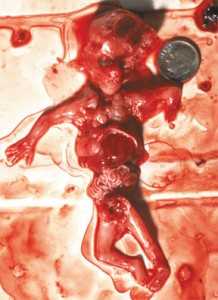
BOSTON — Lawmakers in Massachusetts have voted to override Gov. Charlie Baker’s veto of a bill that allows 16 and 17-year-olds to obtain an abortion without their parents’ consent or knowledge. The legislation, known as the ROE Act, also essentially allows abortion up to birth for “fatal fetal anomalies.”
The House of Representatives obtained the two-thirds majority (107-46) needed to override the veto on Monday, followed by a 32-8 vote from the Senate on Tuesday.
“Today, the Commonwealth reestablished itself as a national leader in health care by removing political barriers to abortion and becoming the first state to legislatively ease burdensome restrictions on young people’s access to care,” the ROE Act Coalition remarked in a statement, according to local television station WCVB.
“The legislature’s leadership means no Bay State family who receives a devastating diagnosis later in pregnancy will ever be forced to fly across the country to access compassionate care and no 16- or 17-year-old will ever be forced to navigate the court system to access the health care they need.”
As previously reported, last month, lawmakers in Massachusetts passed an amendment attached to a budget bill that would essentially allow abortion up to birth for “fatal fetal anomalies” and lower the age of parental consent from under 18 to under 16.
According to text on the legislature website, the amendment permits abortion after 24 weeks when “in the best medical judgment of the physician, an abortion is warranted because of a lethal fetal anomaly that is incompatible with sustained life outside the uterus.”
It permits nurse practitioners, physicians assistants and midwives to perform abortions and states that abortive mothers under 16 must obtain consent from one parent (or can go to the courts if that is not possible), and “in deciding whether to grant such consent, a patient’s parent shall consider only the patient’s best interests.” Those 16 and up will not be required to obtain parental permission.
The amendment passed in the Massachusetts House of Representatives on Nov. 12 by a vote of 108-49, followed by a 33-7 vote in the Senate on Nov. 18.
Gov. Charlie Baker, a Republican who supports the so-called “right to abortion,” said that he was uncomfortable with the provisions that allowed 16-year-olds to obtain an abortion without parental consent and allowed abortion after 24 weeks in some cases. He presented his own version of the legislation that would eliminate those sections.
Both houses of the legislature rejected Baker’s changes and voted to retain the original language.
“Getting ready to vote down @MassGovernor amendment that will deny 16-year-olds the right to independently choose an #abortion,” tweeted lawmaker Marjorie Decker, D-Cambridge. “Let’s be clear; there is no age on prenatal care for young women girls needing #parentalconsent.”
Baker then vetoed the bill as written, and the legislature consequently sought to override his veto and force the matter into law.
“Pregnant people who once faced near-insurmountable barriers accessing abortion care can now seize the right to control their own bodies,” Senate President Emerita Harriette Chandler remarked on Twitter on Tuesday. “I am so proud of the policies included in the #ROEAct and of the (Massachusetts Senate) for our commitment to reproductive freedom.”
The Massachusetts Family Institute, led by president Andrew Beckwith, lamented the passage of the bill, reminding followers that the matter is not simply political; it is spiritual at its root.
“I have to remind myself that ‘we wrestle not against flesh and blood, but against principalities, against powers, against the rulers of the darkness of this world, against spiritual wickedness in high places,'” he wrote. “For, surely, the celebrated, legally sanctioned murder of our children is a great wickedness promoted, ultimately, by ‘the rulers of the darkness of this world.'”
 As previously reported, in early America, Christians were staunchly against abortion for any reason, seeing the shedding of innocent blood (Proverbs 6:16-17) and the discontinuance of a life created and given by God as murder.
As previously reported, in early America, Christians were staunchly against abortion for any reason, seeing the shedding of innocent blood (Proverbs 6:16-17) and the discontinuance of a life created and given by God as murder.
In his 1869 sermon entitled “Ante-Natal Infanticide,” E. Frank Howe, the pastor of the Congregational Church of Terre Haute, Indiana, said, “[I]t makes no matter that the victim cannot stretch out its hands in defense. … It matters not that it … can utter no cry of pain or reproach. The sacred gift of human life is taken — is deliberately taken, and this constitutes the crime, and that crime is murder.”
He lamented that “men and women place their own ease and pleasure above God’s law” and that “public opinion is so corrupted there is no voice of reproach,” forthrightly declaring, “Put what face upon it the community will, disguise it under whatever name you please, you can make no more or less of it than simple murder.”
In 1896, Dr. William McCollom lamented that even in his day, mothers would “unblushingly apply to the physician and to the druggist for medicine to abort [their] pregnancy.”
“Great ignorance of the criminality of the practice is manifested by educated women, but it is not ignorance alone but a downright lack of moral sense as well, which greatly needs educating,” he said, urging doctors to speak out.

McCollom expressed concern that pastors were seemingly not lifting their voice on the issue of abortion as he saw that the practice was both prevalent among the unsaved and “on the increase among professed Christian women.”
“Let us do our duty, if our spiritual advisors neglect to do this, in denouncing this common crime and great sin,” he wrote in addressing his fellow physicians.
“The field for missionary work is a large one and should be faithfully worked, both by the conscientious physician and the Protestant Christian clergy, who perhaps fully understand the enormity of the sin if they do not know how prevalent it is,” McCollom said. “It is not a pleasant subject to discuss before a mixed audience. Young women could be reached, instructed and warned by a properly published circular or tract sent to them by Christian organizations at intervals.”
Read his words, as published by the American Medical Association Press, in full here.
Scripture, in addition to speaking on the value of the unborn, also repeatedly addresses the precursor sin of fornication, teaching in 1 Corinthians 6:13, “Now the body is not for fornication, but for the Lord, and the Lord for the body.”
1 Thessalonians 4:3-5 exhorts, “For this is the will of God, even your sanctification, that ye should abstain from fornication, that every one of you should know how to possess his vessel in sanctification and honor — not in the lust of concupiscence, even as the Gentiles which know not God.”
Verses 7-8 add, “For God hath not called us unto uncleanness but unto holiness. He therefore that despiseth, despiseth not man but God, who hath also given unto us His Holy Spirit.”
Please visit Christian News Network’s Outlaw Abortion page to help us work to abolish the worldwide holocaust.
Become a Christian News Network Supporter...


